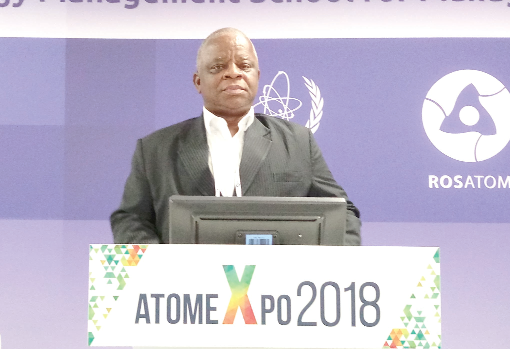
Prof. I. J. Kwame Aboh, Deputy Director General, Nuclear Regulatory Authority, Ghana
As the country inches closer to making a pronouncement on energy production from nuclear sources, the Nuclear Regulatory Authority, Ghana, (NRA) has assured that it will do all it takes to ensure that any future decision and the processes thereafter conform to safety standards to serve the interests of the citizens.
It will do this by ensuring that the processes leading to the construction of a nuclear power plant (NPP) meet all regulatory requirements and the three pillars in nuclear energy production – safety, security and safeguard.
“For our part as regulators, we will see to it that things are done systematically. We will follow all the new recommendations, the safety and security issues to ensure that things are done properly,” the Deputy Director General of NRA, Prof. I. J. Kwame Aboh, told the Daily Graphic in Sochi in Russia yesterday.
“The global community will also be watching because this is big business and it affects everybody.
“The investments are huge, about $5 billion to $8 billion for just one plant and so nobody is going to sit down for his or her investments to go waste just by one mistake,” he added.
ATOMEXPO 2018
Prof. Aboh spoke to the paper on the sidelines of the 2018 ATOMEXPO, an annual event in Russia that brings together global experts in the nuclear industry to discuss new trends, chart new paths and sign bilateral and commercial agreements.
The event is organised by the State Atomic Energy Corporation (ROSATOM). This year’s, the 10th in the series, is on the theme: ‘Global Partnership – Joint Success.
It is being attended by over 600 delegates from 68 countries. It opened on May 14 and will end on May 16.
Ghana’s delegation is led by the Deputy Minister of Energy in-charge of Power, Mr William Owuraku Aidoo and includes the Chief Executive Officer of Bui Power Authority, Mr Fred Oware, the Director General of the Ghana Atomic Energy Commission (GAEC), Prof. Benjamin J.B. Nyarko, and the Member of Parliament for Tain, Mr Gabriel Osei.
Human expertise
Prof. Aboh said the authority and its partner agencies were currently drafting various regulations that would regulate the industry in line with global standards.
As the promoters focus on policy and financial models, he said the NRA was also building the expertise needed to properly regulate the sector “to make sure that there are checks and balances.
“Although we all talk together, we focus on being independent so that we can regulate them,” he said.
Prof. Aboh, who is also the Technical Adviser and Assistant Chief Nuclear Regulatory Officer at the NRA, said the authority currently boasted enough expertise needed to prosecute Ghana’s nuclear desires.
“What is necessary now is the decision. If we decide as a nation that we are doing it (establishing a NPP), then we can proceed from there,” he said.
Currently, the Ministry of Energy and the Attorney General’s Department are preparing a memo for the Cabinet to help make a formal decision on nuclear.
When approved, Ghana will join South Africa as the second country in sub-Saharan African to operate an NPP.
Like Ghana, other African countries, such as Zambia and Nigeria, have also made significant progress towards building NPPs



